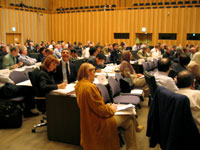Global Climate Change: Climate Science for Decision-Making
Overview
 Group on Earth Observations, Tokyo, April 2004. Loret Ruppe, USAID
The United States is committed to helping developing countries and countries with economies in transition meet environmental challenges such as climate change. Improved understanding of the science of climate change is needed to support the complex decisions that must be made by policymakers. Climate change science is a major component of decision support resources that include “the set of observations, analyses, interdisciplinary research products, communication mechanisms and operational services that provide timely and useful information to address questions confronting policymakers, resource managers, and other users.”(1)
In an effort to increase the resilience to climate variability and change in developing and transition countries, the U.S. Climate Change Science Program (CCSP) seeks to foster the scientific capacity in these countries through its goal of supporting the “development of scientific capabilities and the application of results in developing countries in order to promote the fullest possible participation by scientists and scientific institutions in these countries in the [program] research, observational, and data management efforts.”(1)
USAID’s Approach
The U.S. Agency for International Development (USAID) Global Climate Change (GCC) Program uses climate change science to inform Agency strategies for addressing climate change in developing and transition countries, while building the capacity within these countries to contribute to, and make use of, advances in climate change science. USAID supports international research activities to advance climate change science, to understand the effects of climate change and variability, and to build local scientific capacity. For example, the Agency has provided funding for studies to determine the effects of land use and climate on the biological, physical, and chemical functioning of a region’s ecosystem. Capacity building efforts include supporting the creation and enhancement of regional networks of collaborating scientists and institutions in developing countries that collaborate on environmental change research, assess impacts of and vulnerabilities to climate (or environmental) changes, and provide information to policymakers.
USAID works to advance the science of climate change by engaging in international climate assessment activities through the Intergovernmental Panel on Climate Change (IPCC).(2) Through the IPCC, GCC Team members facilitate the development of the IPCC science assessment reports and support informed decision making through information sharing, training and workshops. The GCC Program serves as an important bridge between the advances in scientific understanding of climate change mediated by the IPCC process and USAID’s development work that relates to climate change mitigation and adaptation.
In addition, USAID actively participates in the CCSP and the U.S. Global Change Research Program.(3) The Agency plays a key advisory role to both of these programs in the development and implementation of U.S. climate change science strategies that have implications for developing and transition countries. USAID supports the fifth goal of the CCSP to explore the uses and identify the limits of evolving knowledge to manage the risks and opportunities related to climate variability and change through funding for the Famine Early Warning Systems Network (FEWS NET). FEWS NET strengthens the abilities of African countries and regional organizations to manage the risk of food insecurity through the provision of timely and analytical early warning and vulnerability information. FEWS NET collaborates with international, national, and regional partners to provide timely and rigorous early warning and vulnerability information on emerging or evolving food security issues. The Agency also participates in the CCSP research-oriented interagency working groups on communications, earth observations, and international research and cooperation, the latter of which makes funding recommendations to the CCSP on international climate research and capacity building programs.
USAID is involved in the efforts of the Global Earth Observation System of Systems (GEOSS) and the United States Group on Earth Observations (US GEO) to improve earth observations through the development of a comprehensive, coordinated, and sustained earth-observing system. Capacity building for the earth-observing system is leading to increased scientific understanding of climate, climate change, and climate variability. This effort also helps to ensure that scientific information can be used to improve applications to benefit society.
Related Links
Linked documents may require Adobe Acrobat Reader for viewing.
U.S. Government Climate Change Programs
International Climate Change Scientific Resources
U.S. Government Agency Climate Change Science Resources
Disclaimer of Endorsement
The pages and documents posted on this Web site may contain links or references to information created and maintained by other public and private organizations, which do not necessarily reflect the views of USAID.
USAID also supports long-term research partnerships between U.S. universities, developing-country research institutions, U.S. agribusiness, and private voluntary organizations through Collaborative Research Support Programs (CRSPs). Through collaboration among these partners, CRSPs address issues of agricultural productivity and sustainability, food quality, and natural resources management in programs that benefit both developing countries and the United States. The research conducted through CRSPs has climate change implications. Improving soil fertility for agriculture by increasing soil carbon (i.e., carbon sequestration) can also reduce the amount of carbon dioxide in the atmosphere. Recycling agricultural wastes as biofuels can reduce emissions of greenhouse gases, and improved agricultural practices can result in a decrease in the release of greenhouse gases from agricultural lands and operations.
Given the Agency’s emphasis on partnerships and alliances, USAID has also supported the Assessments of Impacts and Adaptation to Climate Change (AIACC) project to assess global climate change impacts and developing-country vulnerabilities to these impacts. This effort strengthens the ability of developing-country scientists to assess and evaluate potential climate change impacts and to communicate research results to those who will make long-term development and resource allocation decisions in developing countries around the world.
Conclusion
CRSPs and the AIACC project are just two examples of the types of activities USAID supports that improve the understanding of climate change science by policymakers, resource managers, and others. Scientifically informed policy decisions are essential to sustainable natural resource management and development, key priorities of the Agency.
Footnotes
1. Strategic Plan for the U.S. Climate Change Science Program: A Report by the Climate Change Science Program and the Subcommittee on Global Change Research. July 2003. The Climate Change Science Program, sponsored by 13 federal agencies, integrates federal research on global change and climate change.
2. The IPCC was established by the World Meteorological Organization (WMO) and the United Nations Environment Programme to assess scientific, technical, and socioeconomic information relevant to the understanding of climate change, its potential impacts, and options for adaptation and mitigation. It is open to all members of the United Nations and WMO.
3. The U.S. Global Change Research Program supports research on the interactions of natural and human-induced changes in the global environment and their implications for society.
Please note, many links in the Global Climate Change portion of USAID's web sites point to information on the U.S. State Department and White House web sites. Some of these materials may be under review and temporarily unavailable. These links will be updated on USAID's web sites as soon as possible. Thank you for your patience.
Back to Top ^
|




